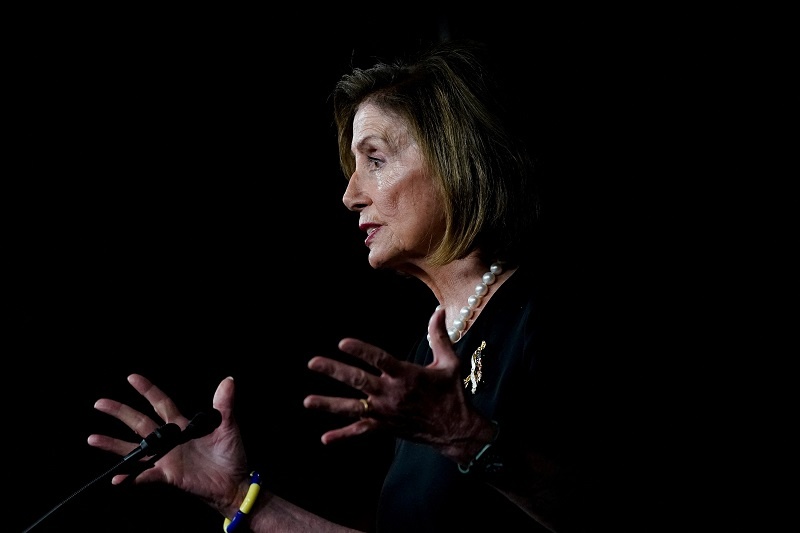
U.S. House Speaker Nancy Pelosi (D-CA) holds her weekly news conference with reporters on Capitol Hill in Washington, U.S., July 14, 2022.
14:49 JST, July 24, 2022
House Speaker Nancy Pelosi’s plans to become the highest-ranking lawmaker ever to visit Taiwan have been long in the making. Now, as she finalizes those plans, the Chinese government is threatening massive retaliation and the Biden administration wants her to delay. Taiwan is caught in the middle. All sides are bracing for a possible crisis that nobody really wants.
This delicate situation raises important questions. Is China bluffing or could Pelosi’s visit really spark a confrontation? Are the benefits of Pelosi visiting at this time worth the risk? And foremost: In our democracy, which branch of government has the final say when they disagree on a matter of foreign policy?
On Wednesday, when President Joe Biden casually confirmed reporting that Pelosi was planning to visit Taiwan in August (she canceled a planned April trip after testing positive for covid-19), he inadvertently revealed the internal U.S. government conflict over the still-unannounced trip. “The military thinks it’s not a good idea right now,” Biden said, adding that he wasn’t sure “what the status of it is.” His comments have complicated already uncomfortable discussions about the potential visit between Biden’s senior national security officials and Pelosi’s office, several administration officials told me.
Of course, Pelosi – as the elected leader of a democratic body – has every right to travel to Taiwan, and Beijing has no right to interfere. A visit by her would be a strong sign of support for Taiwan’s democracy, which is being menaced by China. But the Biden team can’t afford to ignore the associated risks. The Chinese Communist Party is planning to grant President Xi Jinping a third term in November and Biden’s officials believe the period until then is especially dicey.
There are risks to postponing as well. If Pelosi does delay the trip now (even though it has yet to be announced), Beijing could conclude that its strong-arm tactics have worked. China can’t be allowed to think it has a veto every time a congressional delegation wants to visit Taiwan.
“I think that it’s important for us to show support for Taiwan,” Pelosi said at her Thursday news conference, though she declined to confirm that she was planning the trip, citing security reasons. “None of us has ever said we’re for independence when it comes to Taiwan. That’s for Taiwan to decide.”
While it is true that some military leaders are concerned about the trip, they are not the only ones. Over the past several weeks, officials including national security adviser Jake Sullivan, Joint Chiefs of Staff Chairman Gen. Mark Milley, Indo-Pacific Command chief Adm. John Aquilino, NSC Asia czar Kurt Campbell and others have briefed Pelosi or her staff about the intelligence assessments of the risks and the military planning that would be necessary if she goes.
Chinese authorities always complain when congressional delegations visit Taiwan. But administration officials tell me that they have particular cause for concern right now. China, they say, is planning a potentially destabilizing response. They don’t know exactly what Beijing will do, but at least one Chinese state-media commentator has suggested that the Chinese air force might send planes to intercept Pelosi, which could spark a showdown.
The U.S. military is devising options for protecting Pelosi’s delegation, who – as is normal procedure for congressional delegations to Taiwan – would be flying on a military plane. The measures under consideration include moving aircraft carriers or sending fighter planes for close air support. That, in turn, could be misinterpreted by the Chinese side as an aggressive rather than a defensive measure.
Key U.S. allies in Asia have expressed concerns about a visit that they believe will be viewed provocatively, officials said. That could undermine efforts to increase cooperation with some countries over Taiwan in the region, administration officials said.
U.S. officials are also concerned that the Chinese government believes (incorrectly) that Biden supports Pelosi’s trip, contradicting the administration’s current drive to ramp down tensions in the bilateral relationship. As the White House knows well, the speaker can and will make her own decisions on travel. But Beijing may (wrongly) see it as an intentional escalation.
“Who knows, maybe the Chinese back down and there’s nothing there,” said Zack Cooper, senior fellow at the American Enterprise Institute. “But it’s clear Beijing sees this trip by Pelosi differently and as a much more severe break with past policy than some Americans appreciate.”
The White House can’t publicly say that it wants Pelosi to delay, because Biden would be attacked for looking soft on Taiwan. The Biden team has showed overall robust support for Taiwan, including arms sales, military training, diplomatic engagement and consistent U.S. naval missions patrolling the Taiwan Strait as recently as this week.
Taiwan also faces risks, because it could end up bearing the brunt of China’s displeasure. But Pelosi might resist delaying her plans, wanting to assert the independence of the legislative branch and avoid accusations that she caved in to China’s bullying.
The best-case scenario would be for Pelosi and the Biden team to work out a compromise so that America can speak with one voice. For example, if Pelosi does delay, she could send other lawmakers in her place and promise to visit in a few months, to save face and ensure no bad precedent is set.
But if Pelosi goes ahead and visits Taiwan next month, the governments in Washington, Beijing and Taipei will just have to accept it. In democracies, the people and their representatives can visit other democracies whenever they want, without being punished by neighboring dictatorships. That’s a strength, not a weakness, of free societies.
Top Articles in News Services
-

Survey Shows False Election Info Perceived as True
-

Prudential Life Expected to Face Inspection over Fraud
-

Hong Kong Ex-Publisher Jimmy Lai’s Sentence Raises International Outcry as China Defends It
-

Japan’s Nikkei Stock Average Touches 58,000 as Yen, Jgbs Rally on Election Fallout (UPDATE 1)
-

Trump Names Former Federal Reserve Governor Warsh as the Next Fed Chair, Replacing Powell
JN ACCESS RANKING
-

Japan PM Takaichi’s Cabinet Resigns en Masse
-

Japan Institute to Use Domestic Commercial Optical Lattice Clock to Set Japan Standard Time
-

Israeli Ambassador to Japan Speaks about Japan’s Role in the Reconstruction of Gaza
-

Man Infected with Measles Reportedly Dined at Restaurant in Tokyo Station
-

Man Infected with Measles May Have Come in Contact with Many People in Tokyo, Went to Store, Restaurant Around When Symptoms Emerged






















